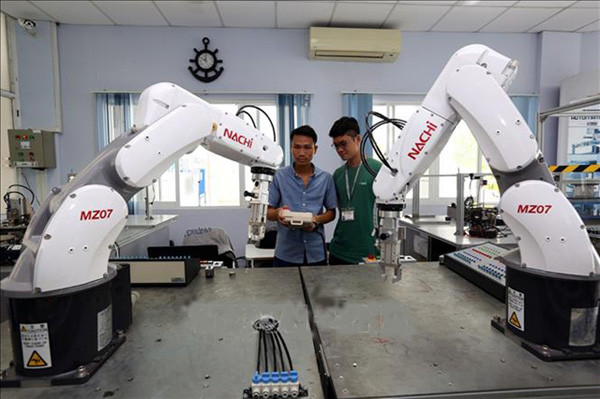
As one of five schools in the city piloting the smart school model from the 2021-22 academic year, the Le Hong Phong High School for Gifted Students has gradually built smart classrooms and applied digital transformation.
The school has increased the application of information technology and artificial intelligence in management and learning activities and maintains a regular online teaching system.
Online storage applications are used so that teachers can store lectures and common resources, aiming to build the school's open learning resource system.
Internet systems, internal servers, equipment and machinery, are invested in meeting operational requirements.
The school is the first in HCM City to teach artificial intelligence to students.
Pham Thi Be Hien, the principal of the school, said that there was no previous model, so when conducting the above contents, the school must research carefully.
It determines that human forces are an important factor in the effective implementation of digital transformation.
Therefore, in addition to training its staff on information technology and foreign languages, the school contracted with experts in artificial intelligence to teach and train teachers in the field.
The school signed cooperation agreements with several foreign schools to exchange and learn about their experiences.
In the future, it will implement many digital transformation projects such as Student attendance management through facial recognition, Applying artificial intelligence to build a system of grading, ranking, evaluating and monitoring students, and implementing an application system for exchanging information between teachers and students.
Many other schools in the city have applied information technology and digital transformation in management, teaching and learning at different levels depending on their actual conditions.
A recent municipal Department of Education and Training survey showed that 88 per cent of schools had digital strategies or plans to insert information technology into teaching and school management.
As many as 82 per cent of students use digital devices safely and appropriately.
About 78 per cent of students improved their learning results using information technology.
As for teachers, 73 per cent used information technology to assess students’ learning results, and 64 per cent used resources shared on the internet.
Along with implementing it in each school, the city has applied information technology in the municipal education and training sector.
This is an important basis for creating an effective, shared sector database.
The city has now piloted 12 online teaching software with content extracted from this shared database.
The database helps overcome school and teachers shortage in the city.
Objectives
One of the great achievements of digital transformation is online teaching combined with in-person teaching, especially during the COVID-19 pandemic.
But Deputy Minister of Education and Training Nguyen Van Phuc said that online teaching and learning during the COVID-19 pandemic was just one of the very simple forms of digital transformation.
The digital transformation that the education industry is aiming for is to build a truly intelligent online learning system with full learning materials and learning management to help students and teachers learn and teach effectively.
To build such a complete system, it is necessary to have specific projects and coordination at the provincial and city levels.
The municipal Department of Education and Training said that digital transformation in the education sector had been implemented drastically. But this was a new issue with no standard model, so when conducting the transformation, the sector must research and adjust, so the results were not as expected.
Furthermore, the technology infrastructure is limited. The department’s survey showed that only 67 per cent of schools have a stable internet connection.
“Digital transformation is the most important solution in leadership innovation, a tool to create breakthroughs in administrative reform, and an important goal and driving force in improving education quality," said Nguyen Van Hieu, director of the HCM City Department of Education and Training.
This is one of the education sector’s key tasks in the coming time.
Training digital skills for teachers is the first solution, along with developing digital data, and building infrastructure to meet the requirements of information technology applications.
The city has set up an overall framework for information technology application in the education sector, said Hieu.
The city’s digital transformation programme to 2025 with a vision to 2030 in education focuses on three major contents, including building a learning system and an open material store, using artificial intelligence to analyse and evaluate the education industry, and blockchain application in management.
Notably, by 2025, the city will make teaching and learning in the digital environment an essential educational activity.
About 25 per cent of primary school programmes and 35 per cent of junior secondary school programmes will be implemented online.
By 2030, the city will bring all elements of the education system into the digital environment.
Source: Vietnam News